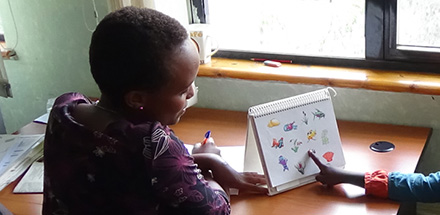September 28, 2020
Dr. Sarah Benki-Nugent with UW and University of Nairobi collaborators receive award to build environmental health research capacity in Kenya
 There is very little data on air pollution exposures in sub-Saharan Africa, and even less is known about the impact of this important exposure on early childhood brain development. Dr. Sarah-Benki (Clinical Assistant Professor, Global Health) and a multi-disciplinary team of maternal-child health researchers from the University of Washington and the University of Nairobi lead the Kenya Healthy Home Healthy Brain Project (KHHOP), a research partnership focused on the impact of environmental pollutants on child neurodevelopment in urban Kenya. KHHOP’s recent efforts include conducting a study that found a combination of air pollution and HIV infection may lead to greater detrimental cognitive functions in children and hosting a workshop for public health professionals and environmental scientists to discuss moving research into policy in Kenya.
There is very little data on air pollution exposures in sub-Saharan Africa, and even less is known about the impact of this important exposure on early childhood brain development. Dr. Sarah-Benki (Clinical Assistant Professor, Global Health) and a multi-disciplinary team of maternal-child health researchers from the University of Washington and the University of Nairobi lead the Kenya Healthy Home Healthy Brain Project (KHHOP), a research partnership focused on the impact of environmental pollutants on child neurodevelopment in urban Kenya. KHHOP’s recent efforts include conducting a study that found a combination of air pollution and HIV infection may lead to greater detrimental cognitive functions in children and hosting a workshop for public health professionals and environmental scientists to discuss moving research into policy in Kenya.
Now, with support from a new five-year Fogarty International Center Global Brain Disorders grant entitled “Air Pollution Exposures in Early Life and Brain Development in Children,” the KHHOP group will focus on the impact of air pollutants on early developmental outcomes in children. Their project will be the first to focus on ambient air pollution and early neurodevelopment in children and will establish a birth cohort to enable further studies on environmental exposures and child neurodevelopment in Kenya. The project will also support capacity building to expand research on Maternal Child Environmental Health in Kenya, through support for mentorship and research opportunities for junior investigators, and annual meetings involving key stakeholders. For their study on air pollution and early developmental outcomes, the group will enroll participants next summer and will follow pregnant women and their infants for three years. The team will characterize early life air pollutant exposures in Nairobi, a densely populated urban environment, and determine whether children with higher air pollutant exposures in early life have worse neurodevelopmental outcomes. They will also develop a novel hybrid approach to modeling air pollution exposure, involving combined indoor and mobile air monitoring.

The child of a study team member demonstrates the cognitive assessment given to children. (Photo courtesy of Sarah Benki)
Key collaborators at the University of Nairobi come from the Departments of Chemistry and Environmental Science to Paediatrics and Child Health (Drs. Farida Were, Michael Gatari, Beatrice Mutai and Elizabeth Maleche Obimbo). Key UW collaborators include Drs. Catherine Karr, Edmund Seto, Anne Riederer and Chris Simpson (Department of Environmental and Occupational Health Sciences), and Julian Marshall and Tim Larson (Civil and Environmental Engineering). The project’s child development experts include Drs. Brent Collet at UW, Susan Wamithi at Aga Khan University in Nairobi, and Michael Willoughby at RTI International. Congratulations to the team for receiving this award that supports the overarching goal to establish a system that connects quality research to policy practice to reduce environmental risks to healthy child neurodevelopment.